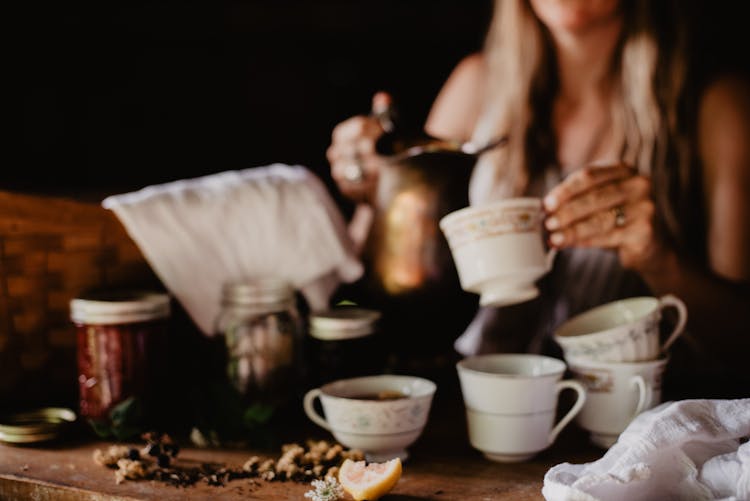Table of Contents
Herbal teas are celebrated for their complex mixture of carotenoids, phenolic acids, and flavonoids, all playing pivotal roles in promoting human health. These bioactive compounds are fundamental in combating oxidative stress, often implicated in chronic diseases. The diversity of these compounds in herbal teas comes from the vast array of plants used to produce them, each bringing its unique signature of health benefits.
Recent studies have shown how these natural components can significantly affect our body's antioxidant capabilities. For instance, rooibos and hibiscus teas are rich in ascorbic acid and flavonoids, aiding in blood pressure regulation and enhancing metabolic functions. Similarly, the chamomile tea, often recommended for its calming effects, contains bisabolol and matricin, which contribute to its anti-inflammatory and sedative properties.
Furthermore, the low or non-existent caffeine content in these teas makes them suitable for any time of the day or night, providing a healthy alternative to caffeinated beverages.
Health Benefits Linked with Herbal Teas
Drinking herbal teas can be a delightful way to support overall health. These beverages offer more than just hydration; they are also involved in enhancing immune functions and reducing the risk of chronic diseases. Each variety has its own set of health advantages. For example, peppermint tea is known for its gastrointestinal benefits and relief from IBS symptoms, while ginger tea is widely recognized for its anti-nausea and anti-inflammatory effects.
Sage tea, another popular choice, has been studied for its potential to enhance cognitive functions and protect against neurodegenerative diseases. Studies have also observed that elderberry tea might shorten the duration and severity of cold and flu symptoms due to its immune-boosting properties.
With their therapeutic effects rooted in centuries of traditional use, these herbal concoctions are now backed by scientific studies confirming their health benefits.
Advice for Consuming Herbal Teas Safely
While herbal teas offer numerous health benefits, it is crucial to consume them with awareness of potential interactions and side effects. Pregnant and breastfeeding women, for instance, should adhere to recommended limits and seek medical advice due to the potent effects of some herbs. Similarly, individuals with pre-existing health conditions or those on medication should consult healthcare professionals to prevent adverse reactions.
For instance, some teas can have diuretic or blood-thinning properties, which may interact with prescription medications. It's also wise to vary the types of herbal teas consumed to avoid excessive intake of any particular compound that could potentially lead to side effects.
Overall, moderation and informed selection are key to incorporating herbal teas into a healthy lifestyle.
A Look at Some Common Herbal Tea Choices
Among the vast choices, some herbal teas stand out for their popularity and health benefits. Peppermint tea, for instance, is highly sought after for its refreshing flavor and digestive health benefits. Chamomile tea is another favorite, widely used for its calming effects and ability to aid sleep. Elderberry, rosehip, and hibiscus teas are praised for their high levels of antioxidants and vitamins, supporting immune health and providing anti-aging benefits.
Furthermore, the growing curiosity in less common herbal teas like valerian root and passionflower reflects a wider acceptance and appreciation of the diverse benefits these natural beverages offer.
Choosing the right herbal tea can depend on personal health goals and taste preferences, each blend offering a unique combination of flavors and health-enhancing properties. From soothing stress to boosting immunity, herbal teas provide a plethora of options for those seeking natural health solutions.
What are the best herbal teas for sleep?
Can herbal teas interact with medications?
"One cannot think well, love well, sleep well, if one has not dined well." - Virginia Woolf This quote reflects the importance of nourishing oneself with healthy choices, including the selection of beneficial beverages like herbal teas.
In conclusion, herbal teas offer a healthful, comforting, and caffeine-free alternative to traditional teas and coffees, each blend providing unique benefits. Whether you are seeking relaxation, a boost in your immune system, or support for digestive functions, there is likely an herbal tea that fits your needs.
Remember, always consult with a healthcare provider to tailor your choice of herbal tea to your specific health conditions and needs.

Commented Posts
Navigation
Latest Posts
Revolutionize Your Marketing with BulkLeads.net
Breaking Bad Habits: A New Approach
Elevate Your Business with Targeted Outreach